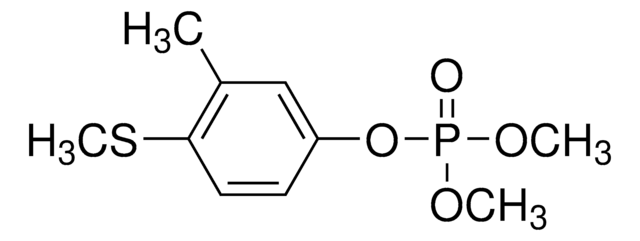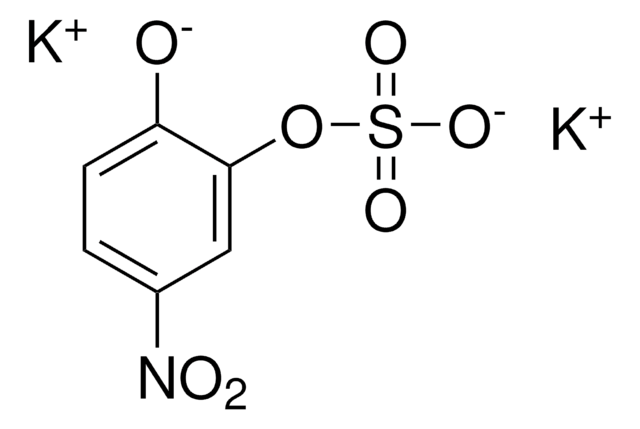77958
Abberior®CAGE 590, NHS-ester
ideal for single-molecule siwtching microscopy (e.g. PALM, STORM, GSDIM)
Faça loginpara ver os preços organizacionais e de contrato
About This Item
Código UNSPSC:
12352108
NACRES:
NA.32
Produtos recomendados
forma
solid
solubilidade
DMF: 0.25 mg/mL, clear
fluorescência
λex 590 nm; λem 600-620 nm in PBS, pH 7
temperatura de armazenamento
−20°C
Descrição geral
Abberior CAGE 590 is a masked dye which is initially colorless and nonfluorescent. When illuminated with UV light it undergoes a rapid uncaging reaction and releases a highly fluorescent dye. The dye opens up the red fluorescent regime for CAGE dyes. It can most effectively be excited from 560 to 600nm.
Abberior CAGE 590 is designed for single-molecule photoswitching microscopy modes such as PALM, STORM and GSDIM and, in its uncaged form, also performs well in STED microscopy. Further, after photoactivation, Abberior CAGE markers can be tracked in confocal and epifluorescence microscopy to analyse molecular dynamics such as diffusion, flow directions and velocities, e.g. are tracking experiments in which the fluorescence signal is observed over time after the initial release of the fluorophore.
Key Features
Absorption Maximum, λmax: 262, 325, 351 nm (non-activated, PBS, pH 7.4)
595 nm (photoactivated, PBS, pH 7.4)
Extinction Coefficient, ε(λmax): 75,000 M-1cm-1 (photoactivated, PBS, pH 7.4)
Fluorescence Maximum, λfl: 615 nm (photoactivated, PBS, pH 7.4)
Photoactivation Wavelength:360 - 440 nm
Recommended STED Wavelength, λSTED: 685 −715 nm
Fluorescence Quantum Yield, η: 0.80 (after photoactivation, PBS, pH 7.47)
Abberior CAGE 590 is designed for single-molecule photoswitching microscopy modes such as PALM, STORM and GSDIM and, in its uncaged form, also performs well in STED microscopy. Further, after photoactivation, Abberior CAGE markers can be tracked in confocal and epifluorescence microscopy to analyse molecular dynamics such as diffusion, flow directions and velocities, e.g. are tracking experiments in which the fluorescence signal is observed over time after the initial release of the fluorophore.
Key Features
- First CAGE dye in the red fluorescent range
- Ideal for PALM, STORM, GSDIM
- Well suited as 2nd STED color (after uncaging)
Absorption Maximum, λmax: 262, 325, 351 nm (non-activated, PBS, pH 7.4)
595 nm (photoactivated, PBS, pH 7.4)
Extinction Coefficient, ε(λmax): 75,000 M-1cm-1 (photoactivated, PBS, pH 7.4)
Fluorescence Maximum, λfl: 615 nm (photoactivated, PBS, pH 7.4)
Photoactivation Wavelength:360 - 440 nm
Recommended STED Wavelength, λSTED: 685 −715 nm
Fluorescence Quantum Yield, η: 0.80 (after photoactivation, PBS, pH 7.47)
Aplicação
Abberior® CAGE 590 anti-rabbit antibody has been used as a secondary antibody for spectral-FPALM (fluorescence photo-activation localization microscopy) imaging of NIH-3T3 cells.
Adequação
Designed and tested for fluorescent super-resolution microscopy
Nota de análise
degree of coupling: report results
Outras notas
For more information on Abberior® Dyes, please visit our overview.
Informações legais
abberior is a registered trademark of Abberior GmbH
Código de classe de armazenamento
11 - Combustible Solids
Classe de risco de água (WGK)
WGK 3
Ponto de fulgor (°F)
Not applicable
Ponto de fulgor (°C)
Not applicable
Certificados de análise (COA)
Busque Certificados de análise (COA) digitando o Número do Lote do produto. Os números de lote e remessa podem ser encontrados no rótulo de um produto após a palavra “Lot” ou “Batch”.
Já possui este produto?
Encontre a documentação dos produtos que você adquiriu recentemente na biblioteca de documentos.
Michael J Mlodzianoski et al.
PloS one, 11(3), e0147506-e0147506 (2016-03-24)
Localization microscopy can image nanoscale cellular details. To address biological questions, the ability to distinguish multiple molecular species simultaneously is invaluable. Here, we present a new version of fluorescence photoactivation localization microscopy (FPALM) which detects the emission spectrum of each
Nossa equipe de cientistas tem experiência em todas as áreas de pesquisa, incluindo Life Sciences, ciência de materiais, síntese química, cromatografia, química analítica e muitas outras.
Entre em contato com a assistência técnica







